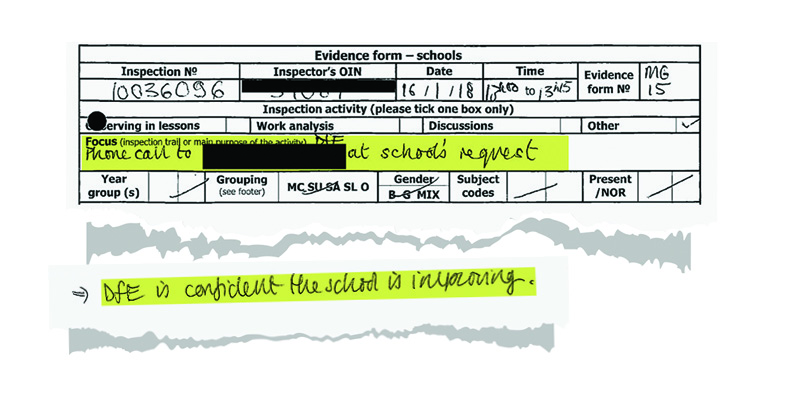An academy trust founded and once chaired by the academies minister received a softened report from Ofsted after inspectors returned just four months after a damning inspection.
Irate union leaders have now suggested the school got “a rehearsal before the real deal”.
The Inspiration Trust, which runs schools across Norfolk and was chaired by Lord Agnew until last September, complained to Ofsted after inspectors wrote a highly critical report on Cobholm Primary Academy.
This raises serious concerns that Ofsted is not completely independent
The watchdog subsequently came back after just four months, rating the school ‘requires improvement’.
Ofsted’s sacrosanct independence is now in question just as Damian Hinds, the education secretary, has promised that Ofsted judgements alone will form the basis for future performance interventions in schools, including forced academy conversions.
Inspectors first visited Cobholm in September, but were unimpressed by pupil attainment data.
A Freedom of Information request for the inspection notes reveal that one inspector – whose identification number is redacted from the documents – disagreed with the head’s view that the school was “good in all areas”.
Official figures show the school, which joined the trust four years ago, had pupil progress scores in the bottom nine per cent of schools for reading and maths last year.
In the notes, the inspector suggests leaders might have been “spinning figures to present the best possible view”.

But when trust staff* were shown the draft inspection report, as is standard after an inspection, they disputed “factual errors”, “gaps” in evidence and “what was felt to be a bias” against the school’s teaching and curriculum methods, according to an Inspiration spokesperson.
When Ofsted considered the complaint as part of its quality-assurance procedure, it decided the evidence was incomplete and, in line with published policy, decided to return for an “additional visit”, confirmed the inspectorate’s spokesperson.
Notes from the second visit are written in different handwriting to the first, and the inspector wrote more positively about the school, praising “the core knowledge approach” and leaders’ “clear vision”.
One page from the second visit set of notes states there was a “phone call to the DfE, at the school’s request”.
Inspiration claimed that a member of regional school commissioner Sue Baldwin’s team gave evidence at both the September inspection and the January inspection by phone call.
The RSC representative felt the school’s data was “disappointing” but that it had “transformed” since joining the trust. Overall, the “DfE is confident the school is improving,” noted the inspector.
There are no documents in the first inspection notes showing any discussion with the RSC’s office, although many pages are heavily redacted.
Lord Agnew, who is now academies minister, had chaired the trust since it was founded, quitting only when he took up his ministerial role in September. There is no suggestion he was involved in the discussions about Inspiration’s performance at the inspection.

Kevin Courtney, the joint general secretary of the National Education Union, has demanded an investigation into the involvement of the RSC’s office into the inspection because it “raises serious concerns that Ofsted is not completely independent.”
His words were echoed by Mary Bousted, his co-leader, who said the outcome of an Ofsted inspection should not be dependent on “how confident or savvy the leaders are in challenging the judgment”.
“The Inspiration Trust has been given a rehearsal before the real deal here.”
In February, Ofsted published a report which graded Cobholm ‘requires improvement’, with ‘good’ for leadership and management, and early-years provision.
Colin Richards, a former Ofsted inspector, said schools should have an opportunity for “redress”, but warned smaller schools tend not to seize the opportunity.
Both Inspiration and Ofsted said the inspectorate had acted in line with their own protocols.
In a separate tweet, Ofsted’s national director of education Sean Harford has estimated about 40 schools get additional inspections a year.
It was also “quite normal for the RSC to [offer a view] as part of a wide range of evidence Ofsted would consider,” added Inspiration’s spokesperson.
*This was changed from ‘trustees’ to ‘trust staff’ to make clear that the trust board were not involved in reviewing the draft inspection report.








Complaints re Ofsted reports are rightly sent to Ofsted. Why, then, was there a ‘phone call to the DfE, at the school’s request’? What was the purpose of the call and who was the intended recipient?
Sir Theodore hasn’t severed ties with Inspiration Trust completely. He’s still a director according to Companies House.
And still a Member according to EduBase (as is Clare Agnew, presumably his wife).
Although this doesn’t necessarily mean anything untoward, I can’t help thinking it is obviously sensible for him to resign as a Trustee and a Member. Probably best for his wife to resign as a Member as well.
When he ceases to be a Minister they could then return to their positions without a perception of conflict.
Congratulations on your descent to the paranoid world of unfounded conspiracy theorists and ludicrous hyperbole.
“Ofsted’s sacrosanct independence is now in question” – it would be laughable if it wasn’t presented in such a po-faced and worthy way.
If there really was such deep-state collusion going on, surely the “damning inspection” would have been stepped on and never heard of in the first place, with the inspector responsible retired out into the wilderness?
So if I read this story right, an Ofsted inspection takes place and the school disagrees with its findings. I hesitate to say that’s not the first ever time this has happened. The school complains, as so many others do, and Ofsted “in line with published policy” returned for an additional visit. So far, so boringly non X-Files. The second inspector is not in full agreement with the first, what a shock.
Unions leaders with a political agenda spout off with predictable outrage.
And journalists, who with a tired and battered sense of optimism I hoped would have tried to actually get to the bottom of the facts behind this situation – i.e. what is actually happening at the school – merely try and come up with the most sensationalist piece possible.
The only thing missing from this article are the words “freemasons” and “Illuminati”.
Mark – you’re right that there’s a complaints procedure which schools can follow if they think their inspection judgement is not valid.
However, there’s a potential conflict of interest when a director of the trust running the school in question is also a schools minister.
And then there’s that letter to the DfE about the inspection. Ofsted is supposedly independent of the DfE so (as I asked above) why was a letter sent to the department?
Genuine concerns about the potential conflict of interest shouldn’t be dismissed with suggestions of conspiracy theories and ‘ludicrous hyperbole’.
Mark – if you don’t like the ‘po-faced and worthy’ tone of the article, try the one I wrote some time ago when Ofsted’s independence was also called into question:
http://www.localschoolsnetwork.org.uk/2012/01/yes-minister-2012-episode-1-the-mouse-that-roared-downhills-primary-says-%E2%80%9Chands-off%E2%80%9D
I agree with you, so the job of a journalist is to investigate the potential conflict of interest and give us something to understand as to whether there really is something of concern here. Otherwise this is nothing but gossip and posturing.
Failing that give us some actual context. How many schools challenge their draft inspection report, and how many of these challenges result in an additional visit? Is this a common scenario, or is this so unusual that suspicion of untoward treatment is objectively justified?
I would also note that Schools Week seem to have made a small but very relevant error in their original article when they said that the Trustees (which or course includes Lord Agnew) had reviewed and disputed the draft inspection report, whereas it now seems that it was the staff instead.
I don’t dismiss concerns about potential conflicts of interest at all. I think they are very important and can’t be allowed to slide – as you’ll see from comments above I don’t think it’s a good idea for Lord Agnew to remain as a Trustee or Member whilst he’s a Minister.
But what annoys me is this holier-than-thou tone where it’s pointed out that one of the inspectors “disagreed with the head’s view that the school was good in all areas”. I’d be amazed if this wasn’t common place, as is “spinning figures to present the best possible view” which is done by everyone from teachers to unions to Governments to me and you.
Mark – it’s difficult to find stats about how many schools contest their judgements. The Ofsted annual report doesn’t seem to give the data (I searched for ‘dispute’ and ‘complain’ – you might have better luck if you search for other words.
I found this on the website of Landmark Chambers re schools going to judicial review:
‘Following a freedom of information request, on 7 November 2017 OFSTED released details’of judicial review challenges it had received since 2007. The table provided is not particularly
clear, but there are 22 challenges, the majority of which settled or were withdrawn. 1 of those is ongoing. Not including those for which the basis of settlement or withdrawal is unclear, there are 5 where the school benefited in some tangible way by the JR.’
http://www.landmarkchambers.co.uk/userfiles/documents/Ofsted,%20inspections%20and%20the%20law%20paper.pdf
TES had an article last year with headline saying it wasn’t worth disputing Ofsted judgements – none of the complaints had resulted in an overturn. (Can’t provide a link and I couldn’t read the whole article)
One Ofsted Inadequate report kept out of the public domain (and eventually reaching the High Court) is Durand. Another is an indadequate judgement for Spalding Academy – this isn’t on Ofsted’s website presumably because the academy had only just been taken over by another academy trust who could hardly have been expected to turn it round from Inadequate in just six weeks (search on LSN for more details).
The only case I know of an Inadequate judgement being swiftly overturned was Langley Hall Primary Academy, a free school in Berkshire.
Instantly you have provided more research and detail than the original article.
I appreciate it’s not easy to find the information, but that’s why we have journalists rather than relying solely on Google.
However I think that what you’re referring to above are mostly formal challenges or judicial reviews of formally released Ofsted reports, which seems to be different to the ‘soft’ challenge to a draft inspection report as discussed in this article.
Mark – I have the luxury of time and not having to work to a deadline. Articles often have to fit a word count. I try to limit my LSN articles to 500 words but that means leaving out a lot of detail.
You’re right about ‘soft’ challenges. These are likely to be under the radar. And it’s unlikely that Ofsted will admit to turning round poor judgements quickly following a complaint – the more judgements overturned, the more Ofsted will be judged to require improvement (or worse) itself.
Yes, but you’re not a professional journalist being paid to write articles for a publication which describes itself as being “in-depth, investigative education journalism”.
I would suggest it’s pretty poor investigative journalism if deadlines and a word count are blamed for not actually doing any investigation.
Alternatively, rebrand the publication.